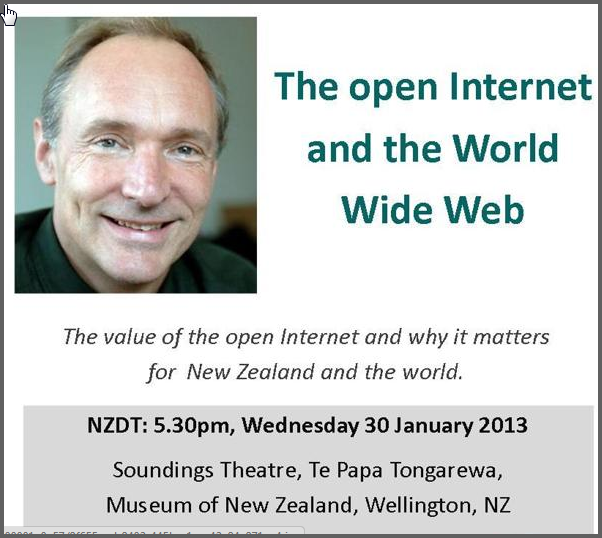aNewDomain.net — As I write, Web pioneer Sir Tim Berners-Lee is getting up on stage in New Zealand to talk about Internet future tech and making a strong appeal to an open Internet. Tune in. It is live now. He wants an open Internet, unfettered by government and regulations. Strong words. I am listening to the first few minutes as I post this. He is taking no prisoners.
If you have difficulties viewing, there’s a direct link below the fold. I love the part where he talks about the beauty of Steve Jobs’ NeXT machine — and about closed versus open Internet approaches and their ramifications worldwide.
Courtesy: Livestream.com
The talk, called the Open Internet and Why It Matters for New Zealand in the World, is live now as I write this, 8:30 p.m. Pacific, 5:30 in New Zealand. He is speaking at the Soundings Theater in Wellington, New Zealand. Wish I was there.
Are you there? We have a lot of aNewDomain.net community folk in NZ and surrounds Let us know. LIVE NOW. The Tim Berners-Lee Down Under tour. It’s Sir Tim Berners-Lee live feed New Zealand. In this live talk, he is appealing governments worldwide to stop attempts at closing the net.

To learn more about Berners-Lee and his contributions to the Web and the inception of HTML, a good link is here.
Tim Berners-Lee bio as described on the W3C consortium page follows:
A graduate of Oxford University, Tim Berners-Lee invented the World Wide Web, an internet-based hypermedia initiative for global information sharing while at CERN, the European Particle Physics Laboratory, in 1989. He wrote the first web client and server in 1990. His specifications of URIs, HTTP and HTML were refined as Web technology spread.
He is the 3Com Founders Professor of Engineering in the School of Engineering with a joint appointment in the Department of Electrical Engineering and Computer Science at the Laboratory for Computer Science and Artificial Intelligence ( CSAIL) at the Massachusetts Institute of Technology (MIT) where he also heads the Decentralized Information Group (DIG). He is also a Professor in the Electronics and Computer Science Department at the University of Southampton, UK.
He is the Director of the World Wide Web Consortium (W3C), a Web standards organization founded in 1994 which develops interoperable technologies (specifications, guidelines, software, and tools) to lead the Web to its full potential. He was a Director of the Web Science Trust (WST) launched in 2009 to promote research and education in Web Science, the multidisciplinary study of humanity connected by technology.
developing …












